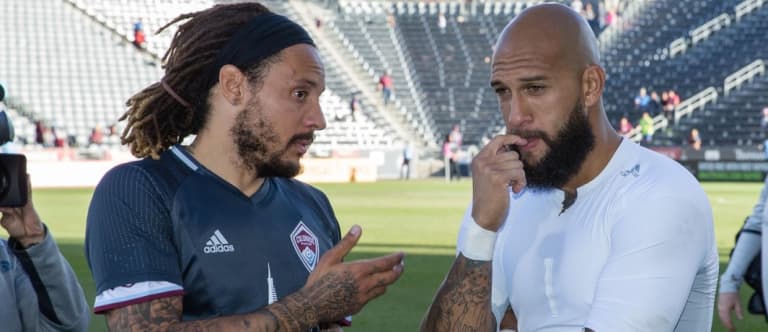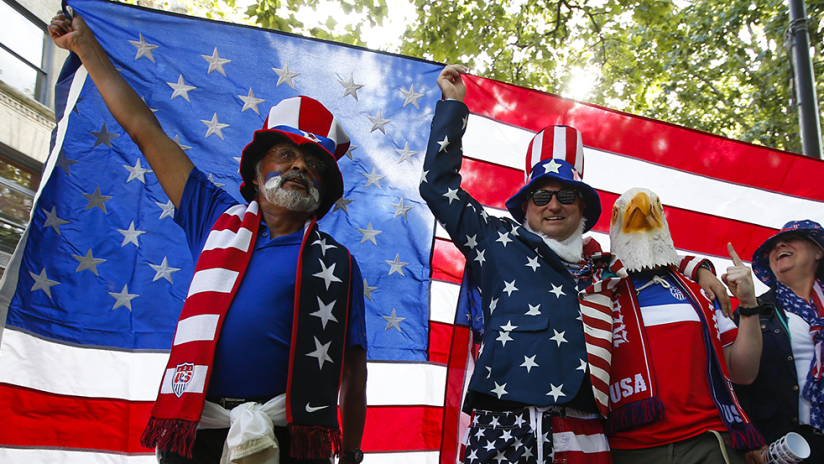When it comes to the United States, the nature of what – or who – has been, is and will be considered "American" has been amorphous, the nature of debates civil and contentious since the country's founding. The US national team has been no exception, from Joe Gaetjens to David Regis to the current crop of "dual-nationals."
That latter group, most recently with its heavy German makeup under former coach Jurgen Klinsmann, was uncomfortably brought to the fore last week, when Colorado Rapids goalkeeper Tim Howard made critical comments in a USA Today interview, most notably stating that "having American roots doesn’t mean you are passionate about playing for that country" and following it with "I know there were players that came in that it didn’t matter as much to."
Howard didn't express himself terribly well, and without trying to get in his head, it's safe to say he was referencing results like December's listless 4-0 loss to Costa Rica, one that ultimately sank Klinsmann's badly listing US tenure. But that brick was a team effort – by every "[hyphen]American" on the roster, whether born in Brooklyn or Berlin, and indicative that it's time to stop drawing a distinction.
Far too often under Klinsmann's run, explicitly or not, the "German-Americans" were grouped separately for analysis and criticisms. (See: The infamous Sporting News article; See also: Green, Julian)
And that's going to end under Bruce Arena.
Klinsmann's replacement, now in his second term helming the USMNT, spiked the concept at November's media roundtable: "The phrase 'foreign nationals' is a very poor term, whoever uses it. I will not use it. I will not use 'dual citizens'; they are national team players."
Arena got there after his own muddled messaging moment, a 2013 ESPN The Magazine interview excerpt that clung to him long enough that he spent part of Day 1 on the job clarifying a years-old comment.
The next time someone feels a sentence singling out the dual nationals coming on, they'd be wise to heed the words of one of those German-born players, LA Galaxy midfielder Jermaine Jones. A Rapids teammate of Howard last year and a longtime USMNT compatriot, Jones told told ESPN’s Doug McIntyre:
"It’s dangerous stuff where you have to be careful what you’re saying. With all the respect for Timmy [Howard], I feel it’s not if you’re half-American or full-American. It’s more what you have in here [Taps his chest.]"

North Brunswick-born Howard and Frankfurt-bred Jones come from different places, but have both been rightly viewed as key cogs and contributors to the program; Howard made sure to identify Jones as "a rock" and "one of the heartbeats" of the team in his inevitable clarification, in which he specified that his comments were not just directed at dual nationals.
These questions of passion have nothing to do with city, state or even country of origin as Howard himself learned: He had to deal with them during a year-long sabbatical from the USMNT, as did Redlands, California's Landon Donovan (most crushingly by Klinsmann) and, more recently, the Timbers' Darlington Nagbe – a Liberia-born midfielder who grew up in Ohio and reportedly declined a call-up to spend more time with his family.
In initially describing Klinsmann's outreach efforts as "a good idea in theory," Howard is on to something. It's smart to take advantage of the depth of cross-cultural heritage inherent to "America," especially in the world's game. With a World Cup at stake, we should be celebrating the unifications possible under that expansive umbrella.
But just because someone is technically skilled and "eligible" doesn't a national teamer make. They should feel pride and passion for the flag, however they got there, and that determination, part of the onboarding process. If Arena and his staff – and Howard and his teammates – don't get that read, it shouldn't get to the point of media-mouthpiece moments, just an innocuous exit from the international stage.
Everyone involved is working toward raising that World Cup (or at least a return to the semifinals to start) and that's going to take a team that's not only playing well, but playing together – for the flag. For "America."













